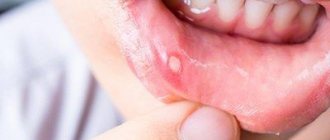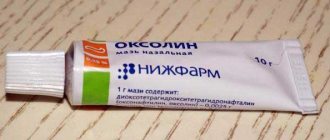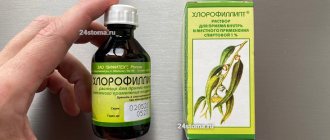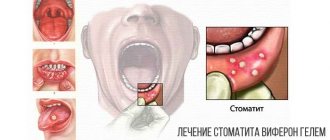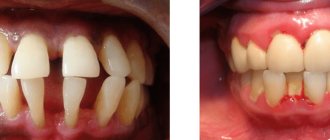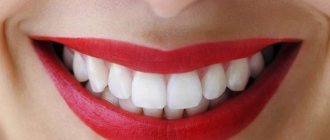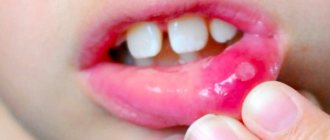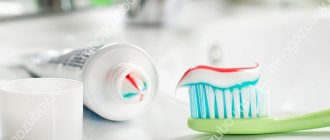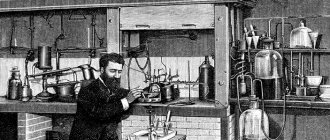Hexoral for stomatitis is one of the most effective drugs. It has a wide spectrum of action, therefore it is approved for both fungal and herpetic stomatitis. Self-medication for stomatitis is not recommended, since this disease develops rapidly and is fraught with dangerous complications. Hexoral cannot be used uncontrollably; the active components can cause side effects.
What helps well with stomatitis?
July 5, 2022
2141
5
2
Content
- Why does stomatitis occur?
- Who most often gets stomatitis?
- Types of stomatitis
- Symptoms of stomatitis
- How to treat stomatitis?
- The best remedies for treating stomatitis
- Holisal
- Stomatidin
- Kamistad gel
- Hexoral Tabs
- Lidocaine Asept
- Solcoseryl dental adhesive paste
- Metrogil Denta
With stomatitis, the mucous membrane of the mouth becomes inflamed. Typically, stomatitis occurs in children due to poor hygiene (dirty hands in mouth, dirty objects). Stomatitis can be either an independent disease or appear against the background of dental problems, mechanical damage to the mucous membrane, or infections. Stomatitis looks like mouth ulcers or large inflammations. Stomatitis is completely curable if you consult a doctor in time and start therapy immediately.
Contraindications and side effects
Hexoral is extremely rarely prescribed to children under 3 years of age. The drug is contraindicated for people with hypersensitivity to the components. If you are prone to allergies, you should use Hexoral therapy with caution.
Possible side effects:
- nausea and vomiting;
- convulsions;
- breathing problems;
- dysfunction of the cardiovascular system;
- change in taste perception;
- numbness of the oral cavity;
- change in tooth color.
Overdoses of Hexoral occur extremely rarely. If a child swallows the drug and experiences nausea and vomiting, contact a medical facility immediately. Before arriving at the hospital, you can give your child activated charcoal.
Why does stomatitis occur?
There are many causes of stomatitis, including:
- diseases of the gastrointestinal tract and oral cavity;
- conditions after chemotherapy;
- burns from hot food, injuries to the oral mucosa and gums;
- lack of vitamins and unbalanced diet;
- as a “side effect” against the background of cancer;
- as a consequence of hormonal problems;
- smoking and alcohol abuse;
- oral infections;
- some chronic diseases;
- lack of necessary oral hygiene;
- long-term use of certain medications.
Who most often gets stomatitis?
- Children under 7 years old. About half of preschoolers experience stomatitis at least once due to lack of the habit of washing their hands frequently.
- Elderly people with chronic diseases and dental problems.
- People who have a weakened immune system after illness, chemotherapy or organ transplantation.
- Those who live in unsanitary conditions or do not observe personal hygiene rules.
- Smokers, regardless of length of service.
- People after a long course of antibiotics.
- People who have asthma and use inhalers but do not use them properly.
According to statistics, the frequency of cases of stomatitis is lower in large cities, and higher in villages.
Can Hexoral be used for children?
Children under 3 years of age are not prescribed Hexoral solution for rinsing. The aerosol can only be used from 4 years of age. This is due to the high allergenicity of the drug and the presence of a large list of contraindications. If it enters the stomach and bronchi, ethyl alcohol, which is part of Hexoral, can cause poisoning. It is noteworthy that the aerosol contains three times more ethyl alcohol than the solution.
Lollipops are contraindicated for children under 4 years of age due to the presence of benzocaine, which can cause disruption in the functioning of important systems of the growing body. In addition, benzocaine can change the composition of the blood (methemoglobinemia), which can lead to suffocation and blue discoloration of the skin. Hexoral tablets are approved for children over 12 years of age.
There is no special Hexoral spray for children for the reason that children do not know how to properly carry out the irrigation procedure and hold their breath. Thus, the child swallows the drug, which is fraught with unpleasant symptoms.
Types of stomatitis
Stomatitis can be of infectious or non-infectious origin (it all depends on the reasons that caused the inflammation).
Viral stomatitis.
This stomatitis occurs against the background of an infectious disease or due to pathogenic microorganisms. Bubbles with a clear liquid appear on the oral mucosa, which gradually becomes cloudy. When these blisters burst, ulcers appear.
Bacterial stomatitis.
Occurs due to damage to the body by streptococci or staphylococci. Pathogenic microflora quickly spreads throughout the oral mucosa, where purulent ulcers appear.
Fungal stomatitis.
With this stomatitis, ulcers with a white coating form on the oral mucosa.
Radiation stomatitis.
It occurs against the background of ionizing radiation and looks like painful erosions and thickening on the oral mucosa.
Chemical stomatitis.
Occurs after chemical burns of the mucous membrane. When the wounds heal, dense scars remain.
Aphthous stomatitis.
This is one of the most common stomatitis and occurs against the background of reduced immunity and problems with the gastrointestinal tract. Painful wounds up to 5 mm appear in the mouth, which quickly increase in size.
Allergic stomatitis.
Such stomatitis occurs against the background of external irritants and goes away without treatment if provoking factors are removed (medicines, incorrectly selected dentures, certain foods).
How to treat stomatitis?
If you consult a doctor at the first symptoms of stomatitis, treatment will be symptomatic and will last about a week. If it turns out that stomatitis is caused by an infection, its treatment will be as follows:
- anti-inflammatory drug (plus for other main symptoms);
- ointments and gels for local treatment;
- drugs to destroy the causative agent of the disease.
Drugs for the treatment of infectious stomatitis may include antibiotics, painkillers, antiseptics, and antiallergic agents. Typically, such stomatitis is treated for about 10 days. If it turns out that stomatitis is a secondary problem against the background of any chronic disease, treatment will be aimed at eliminating the underlying disease.
To speed up the process of treating stomatitis, the following additional measures are used:
- avoidance of foods that may irritate the mucous membranes;
- introduction of fermented milk products into the diet;
- rinsing the mouth with a decoction of calendula and chamomile;
- treating wounds in the mouth with aloe juice or sea buckthorn oil.
A doctor must monitor the treatment of stomatitis in order, if necessary, to adjust the course in time and prevent “side effects”.
Holisal
The undoubted advantage of this gel for stomatitis is that it lasts the longest after application. The main active ingredient of Cholisala is salicylate. It instantly penetrates the affected area, relieves inflammation and has an antipyretic effect. "Cholisal" only slightly anesthetizes, in this regard it is significantly inferior to similar drugs. Stomatitis gel perfectly fights pathogenic microorganisms, is well applied to the mucous membrane and stays on it for a long time. The effect of the Cholisal gel after application lasts about eight hours. The product has a sweetish taste, it is colorless, economical in use and suitable for adults and children. "Cholisal" has no allergic reactions or side effects. The only contraindication for this drug for stomatitis is individual intolerance.
Holisal
Pharmaceutical plant Elfa A.O., Poland
For local use on the mucous membranes of the oral cavity as an analgesic and anti-inflammatory agent in the treatment of periodontal diseases, damage to the mucous membrane, diseases that occur with an inflammatory reaction and pain: - stomatitis of various etiologies;
- gingivitis; - periodontitis; - damage to the oral mucosa when wearing dentures; - trauma to the oral mucosa; - pain during teething in children; - cheilitis; — candidiasis of the oral mucosa; — minor surgical interventions in the oral cavity; - lichen planus when localized on the oral mucosa; — damage to the oral mucosa in Stevens-Johnson syndrome (as part of complex therapy). from 204
5.0 6 reviews
1234
- Like
- Write a review
Is it possible to use Hexoral for a dry cough?
A dry cough indicates that the mucous membrane of the respiratory tract is inflamed. Any dry cough needs to be made wet, that is, productive. Only a wet cough can remove harmful substances from the respiratory tract. This will significantly speed up the healing process. The only exception is an allergic dry cough, which is not related to pathogenic flora in the sputum.
The use of Hexoral does not have a mucolytic or expectorant effect. However, the use of lozenges provokes greater secretion of saliva, due to which the mucous membranes are moistened and the cough can become wet.
Despite the lack of mucolytic effect, Hexoral is also indicated for dry cough. This is explained by the fact that cough is only a symptom, not a diagnosis. It is the disease that needs to be treated, not the cough. Hexoral, having an antiseptic effect, successfully destroys the source of infection in the throat.
Stomatidin
"Stomatidin" is available in the form of a solution for stomatitis, but it is very easy to use. The aerosol is convenient for spot-treating mouth ulcers; it reduces inflammation and removes unpleasant odor if there are wounds with pus. It is convenient that the spray gets into all hard-to-reach places where there are inflammations and ulcers. Literally on the second day after using Stomatidin, the situation improves. The instructions say that the course of treatment for stomatitis with this solution is seven days. At this time, it is recommended not to eat spicy, salty or fried foods. "Stomatidin" has a sweetish taste. During the treatment of stomatitis with this drug, it is advisable to take immune-supporting agents. You can’t swallow “Stomatidin” - severe diarrhea is possible.
Stomatidin
Bosnalek, Bosnia and Herzegovina
- infectious and inflammatory diseases of the oral cavity and pharynx: tonsillitis (including tonsillitis with damage to the lateral ridges, Plaut-Vincent tonsillitis), pharyngitis, gingivitis, bleeding gums, periodontopathies, stomatitis, glossitis, aphthous ulcers to prevent superinfection;
- to prevent infection of the alveoli after tooth extraction; - fungal infections of the oral cavity and pharynx (especially candidal stomatitis); — before and after operations in the oral cavity and pharynx; — additional oral hygiene for general diseases; - in order to eliminate bad breath, especially in the case of decaying tumors of the oral cavity and pharynx. from 214
5.0 7 reviews
542
- Like
- Write a review
Hexoral aerosol
The active ingredient in Hexoral aerosol is hexetidine. It is an antiseptic that prevents the oxidative reactions of bacteria necessary for metabolism. This is how its antimicrobial effect manifests itself. In addition, Hexoral in spray form is also active against fungi that cause candidiasis.
The use of the aerosol is permitted for children from the age of three. The substances are not absorbed into the blood, and traces of hexethidine remain in the oral cavity for another 60 hours after the first use. An aerosol is prescribed for sore throat caused by ARVI, bacterial or fungal infections.
Kamistad gel
“Kamistad gel” for stomatitis perfectly anesthetizes the mucous membrane with stomatitis and any damage in the mouth. The active ingredients of this product are lidocaine hydrochloride and chamomile flower extract. “Kamistad gel” helps to relieve pain and inflammation for a long time, and heals wounds on the mucous membrane. This drug is conveniently distributed, and the discomfort goes away almost immediately after application. If you strictly follow the instructions, there will be no adverse reactions. Before applying Kamistad Gel, the affected areas of the mucous membrane must be dried from saliva.
Kamistad-gel N
STADA Arzneimittel, Spain
The combined drug Kamistad gel N. Lidocaine has a local anesthetic effect, which helps to quickly and lastingly reduce pain due to inflammation and damage to the mucous membrane of the oral cavity and gums.
Chamomile flower extract has anti-inflammatory, antiseptic and regenerating properties. from 217
5.0 1 review
309
- Like
- Write a review
About the drug
Hexoral is a drug that has antimicrobial, analgesic, antiseptic and hemostatic effects. The active substance is hexetidine. It actively fights gram-positive and gram-negative microorganisms and promotes pain relief. The drug envelops the mucous membrane, providing a long-lasting effect.
Hexoral also contains essential oils, methyl salicylate and other components designed to enhance the antimicrobial effect of the product. Hexoral forms a thin film on the mucous membrane, which prevents the proliferation of harmful microorganisms. The advantage of Hexoral is its versatile effect on the mucous membrane: destruction of bacteria and fungi, stopping bleeding, enveloping and anesthetizing, accelerating the healing process of ulcers.
The therapeutic effect is achieved not only by improving blood supply and stimulating tissue regeneration, but also due to the reflex reaction that occurs when receptors are irritated. Hexoral is prescribed for inflammatory processes in the oral cavity. It is noteworthy that the drug is approved for both adults and children.
Hexoral Tabs
This drug for stomatitis contains chlorhexidine and an anesthetic, and instead of the anesthetic lidocaine, benzocaine. Additional ingredients are menthol and peppermint oil. Hexoral Tabs relieves pain and inflammation well, kills bacteria (although it does not have such a strong effect as specialized drugs against stomatitis). Benzocaine relieves pain instantly, although not for a long time. The product is very cooling due to the mint and menthol in the composition, so it may burn a little in the first seconds. But then the pills become sweet, and the pain in the mouth goes away. Hexoral Tabs is not prescribed as a separate remedy for the treatment of stomatitis - only in combination with other, stronger drugs.
Hexoral tabs
Pfizer (Pfizer), USA
Infectious and inflammatory diseases of the pharynx or oral cavity: - pharyngitis, sore throat and other inflammatory diseases of the pharynx;
- stomatitis; - gingivitis. from 99
5.0 1 review
319
- Like
- Write a review
special instructions
Local antiseptics do not play a big role in the treatment of acute manifestations of any respiratory diseases. The use of such drugs is important mainly when the patient feels the beginning of a sore throat. At the initial stages of the spread of infection, Hexoral is able to suppress the pathogen and prevent the infection from spreading and becoming acute.
If the use of the drug does not produce positive dynamics within 7 days, you must stop self-medication and seek qualified help.
Lidocaine Asept
An excellent remedy for stomatitis pain relief, it is one of the most powerful. "Lidocaine Asept" blocks nerve impulses in tissues, affecting the cell membrane - the pain disappears in just a few seconds. Since the drug is too strong, it is not suitable for children. In addition to lidocaine, this product contains chlorhexidine to fight microbes - it destroys fungus, bacteria, and yeast. “Lidocaine Asept” for stomatitis is convenient to apply pointwise to painful areas of the mucous membrane - the drug does not “freeze” the entire mouth, but only those places where the product is applied.
Lidocaine Asept
JSC NPC "Biogen", Russia
Lidocaine-Asept spray for topical use has a local anesthetic and antiseptic effect and causes terminal anesthesia.
from 240
5.0 1 review
365
- Like
- Write a review
Solcoseryl dental adhesive paste
It is considered one of the best drugs for the treatment of stomatitis, improves tissue nutrition. The active substance of Solcoseryl ointment - hemodialysate - heals ulcers, wounds, abrasions and scratches. “Solcoseryl” well stimulates the regeneration processes of the oral mucosa, disinfects, and restores cells. But you need to take into account that Solcoseryl is not an antiseptic, so before applying this paste for stomatitis, you need to rinse your mouth, for example, with Chlorhexidine. The drug has no contraindications other than individual intolerance.
Solcoseryl dental adhesive paste
Meda Pharma, Switzerland
Wound healing, angioprotective, membrane stabilizing, regenerating, cytoprotective, antihypoxic drug, which is available in the form of an injection solution, gel and ointment for external use.
from 486
1.0 1 review
1170
- Like
- Write a review
Metrogil Denta
This stomatitis gel has a consistency similar to toothpaste, is easy to apply, and thanks to its unobtrusive mint taste, it does not cause rejection in children. Improvement in the situation with stomatitis occurs literally on the second or third day from the start of treatment with Metrogyl Denta. The drug relieves pain and destroys pathogenic microbes. The course of treatment with Metrogyl Denta is seven days; if there are no noticeable improvements, we recommend using a drug for stomatitis with a stronger effect. "Metrogil Denta" does not destroy beneficial lactobacilli, so the microflora of the oral cavity will not be disturbed. The drug has a long shelf life, so it is advisable to have it in your home medicine cabinet. At the initial stages of stomatitis in children, Metrogyl Denta is very effective.
Metrogil Denta
How much does Hexoral rinse solution cost?
Hexoral solution is used exclusively for rinsing the mouth. The drug should not be swallowed, therefore, if the patient, due to age or some other characteristics, cannot spit out liquid that has entered the mouth, the form of mouthwash is not suitable for such patients.
Rinsing with Hexoral is effective not only for pain or inflamed tonsils, but also for stomatitis or inflammation of the gums.
The drug is sold in aerosol form at pharmacies. No doctor's prescription required. The average cost of one bottle is 300 rubles.
